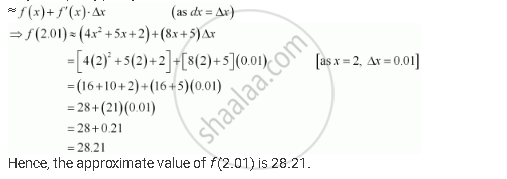Advertisements
Advertisements
Question
Find the approximate value of f (2.01), where f (x) = 4x2 + 5x + 2
Solution
Let x = 2 and Δx = 0.01. Then, we have:
f(2.01) = f(x + Δx) = 4(x + Δx)2 + 5(x + Δx) + 2
Now, Δy = f(x + Δx) − f(x)
∴ f(x + Δx) = f(x) + Δy

APPEARS IN
RELATED QUESTIONS
Find the approximate value of ` sqrt8.95 `
Using differentials, find the approximate value of the following up to 3 places of decimal
`(26)^(1/3)`
Using differentials, find the approximate value of the following up to 3 places of decimal
`(0.0037)^(1/2)`
Using differentials, find the approximate value of the following up to 3 places of decimal
`(26.57)^(1/3)`
Using differentials, find the approximate value of the following up to 3 places of decimal
`(32.15)^(1/5)`
Find the approximate change in the volume V of a cube of side x metres caused by increasing side by 1%.
Find the approximate change in the surface area of a cube of side x metres caused by decreasing the side by 1%
If f (x) = 3x2 + 15x + 5, then the approximate value of f (3.02) is
A. 47.66
B. 57.66
C. 67.66
D. 77.66
The normal at the point (1, 1) on the curve 2y + x2 = 3 is
(A) x + y = 0
(B) x − y = 0
(C) x + y + 1 = 0
(D) x − y = 1
Find the approximate change in the volume ‘V’ of a cube of side x metres caused by decreasing the side by 1%.
The radius of a sphere shrinks from 10 to 9.8 cm. Find approximately the decrease in its volume ?
1 Using differential, find the approximate value of the following:
\[\sqrt{25 . 02}\]
Using differential, find the approximate value of the \[\left( 15 \right)^\frac{1}{4}\] ?
Using differential, find the approximate value of the \[\left( 255 \right)^\frac{1}{4}\] ?
Using differential, find the approximate value of the loge 10.02, it being given that loge10 = 2.3026 ?
Using differential, find the approximate value of the log10 10.1, it being given that log10e = 0.4343 ?
Using differential, find the approximate value of the \[\cos\left( \frac{11\pi}{36} \right)\] ?
Using differential, find the approximate value of the \[\sqrt{26}\] ?
Using differential, find the approximate value of the \[\left( 82 \right)^\frac{1}{4}\] ?
Using differential, find the approximate value of the \[\sqrt{36 . 6}\] ?
Using differential, find the approximate value of the \[\left( 3 . 968 \right)^\frac{3}{2}\] ?
Using differential, find the approximate value of the \[\sqrt{0 . 082}\] ?
Using differential, find the approximate value of the \[{25}^\frac{1}{3}\] ?
Find the approximate value of log10 1005, given that log10 e = 0.4343 ?
Find the approximate change in the surface area of a cube of side x metres caused by decreasing the side by 1% ?
Find the approximate change in the value V of a cube of side x metres caused by increasing the side by 1% ?
If there is an error of a% in measuring the edge of a cube, then percentage error in its surface is
While measuring the side of an equilateral triangle an error of k % is made, the percentage error in its area is
Find the approximate values of : `root(3)(28)`
Find the approximate values of : (3.97)4
Find the approximate values of : cos(60° 30°), given that 1° = 0.0175°, `sqrt(3) = 1.732`
Find the approximate values of : tan–1(0.999)
Find the approximate values of : cot–1 (0.999)
Find the approximate values of : 32.01, given that log 3 = 1.0986
Using differentials, find the approximate value of `sqrt(0.082)`
If the radius of a sphere is measured as 9 m with an error of 0.03 m. the find the approximate error in calculating its surface area
The approximate change in volume of a cube of side `x` meters coverd by increasing the side by 3% is
Find the approximate value of tan−1 (1.002).
[Given: π = 3.1416]
